School Governors: Asking the right questions about mental health
Schools are a front line service. So, what role do school governors have when it comes to mental health?
What are the questions governors can ask to support the mental health of pupils and staff?
One role of school governors is being a critical friend. Here you’ll find questions and information to help governors fulfil this role.
The questions are split into six sections and can be used by governors of both mainstream and special; primary and secondary and also PRUs.
A useful approach is to choose a small number of questions that best fit your school.
A Brief Background
NHS data shows that mental health issues are common amongst children and young people.
There have been concerns about mental health services being hard to access for many years. The Children’s Society also report some worrying data. Although it’s worth noting that this is now over 2 years old, many in schools will recognise this today.

That said, the data is complex. Bad news makes great headlines – there are awesome clinicians doing their best very single day. If we put too much focus on the big issues, we might miss how we can make things better in our school.
Or, to put it another way: Today is a perfect day for governors to ask effective questions about mental health.
What should school governors ask?
Most schools already have policies in place that refer to mental health. They also have systems to report wellbeing concerns (e.g. to the DSL).
Most governors are already aware of both their policies and systems. So, the following questions dive deeper in to the details.
Mental Health Questions
1. Impact of School’s Mental Health Work
- What impact has our current provision already had?
- How do we evaluate the impact of our current provision?
- Do we use, for example:
- Pupil, staff or parent surveys
- Staff leavers questionnaires
- School Council discussions
- Learning walks / lesson observations
- Absence monitoring
- If we develop our mental health provision, how might we see an impact on, for example:
- Bullying
- Parental satisfaction
- Number of safeguarding incidents that include mental health factors
- CYP persistent absence
- Staff retention
- CYP leaving our school (e.g. because the school place has ‘broken down’)
- Use of partial timetables
2. Long Term Direction

- What’s the vision for our mental health provision in two or three years’ time?
- Does our work fit in with local or national initiatives at all?
- Should governors expect to see mental health featured in the next school improvement plan?
- How and when do you plan to update governors on developments?
3. Leadership

- How do our leader’s approaches support the wellbeing of staff?
- Do leaders always treat others as they would want to be treated themselves?
- What staff debriefing is in place (e.g. a following a distressing or violent incident?)
- How do we avoid our wellbeing initiatives being squeezed out by academic priorities?
- How do pupil views inform our mental health work?
4. Teaching & Learning

- In our curriculum, how well sequenced are mental health lessons?
- Are there teams within school (e.g. year group or subject) who are doing especially well regarding mental health? If so, what are they doing well?
- How do we monitor teaching of mental health content to check it is high quality?
- How do we make sure that promoting wellbeing happens all the time and not, for example, just during awareness weeks?
- What do we teach about SEND to help all pupils show tolerance and empathy?
- How do we teach about SEND to help individual SEND pupils better understand and accept their own disability (e.g. an autistic pupil)?
5. Adult Learning & Development

- What staff training have we had and who attended?
- The head teacher?
- The school leadership team?
- Teachers & teaching assistants?
- Non-teaching staff?
- What impact has staff training had?
- Are governors invited to attend this training?
- What training for families do we provide?
- How do we know if training for families is successful?
6. Information & Partnerships

- What mental health info is on our website?
- Is our website’s mental health info well curated and organised (i.e. rather than a large volume of info, it’s a careful selection of the most relevant info)?
- If I walk around school, what can I see or hear that tells me about our approach to mental health?
- How good are transition arrangements for vulnerable pupils who join or leave our school?
- What impact do we see from our team work with:
- Child & Adolescent Mental Health Services (CAMHS)?
- Parents / carers?
- Anyone else?
Links to background reading for School Governors

- Young Minds – Support for young people and professionals
- CAMHS Website – A directory of support services and charities
- Papyrus – UK young suicide prevention charity
One last tip for school governors
Remember that it can be exceptionally tough for school leaders and staff who are responsible for safeguarding.
The questions are about everyone’s mental health. That includes staff and leaders.
Whatever and however you ask, treat leaders with dignity and respect.
Now. As ever.
More advice and support
Or, to ask questions or get support, please get in touch.
Get in touch
Have a question? Think we could help you? Please contact us to discuss how we might help you.
Drop us an email or give us a call
director@9000lives.org
0788 42 42 719



